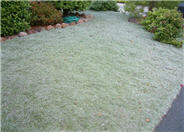
Common name:Dymondia, Rock Ditty
Botanical name:Dymondia margaretae
This foliage is gray/green/silvery; it is a very dense, mat forming ground cover. It tolerates drought, cold, salt spray and poor soils. It's deep rooted and produces small, inconspicuous yellow flowers. Rock Ditty is great for use in between stepping stones or pavers.
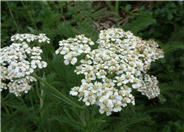
Common name:Yarrow
Botanical name:Achillea millefolium
This Achillea features spreading mats of fern-like rosettes, along with deeply divided leaves of a green or gray green color. In this form, the flowers are usually a white tone. Stems can reach 2'-3' above foliage. Yarrows propagate easily from rooted cuttings or division, which should be performed in the early spring or fall. Following bloom, one should dead head the plant and divide the clumps when it appears crowded.
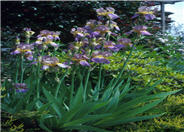
Common name:Bearded Iris
Botanical name:Iris Bearded Hybrids
This perennial will grow 1'-3' tall and has medium size, blue green leaves with wonderful flowers that come in a variety of colors.
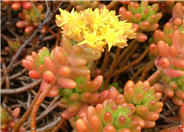
Common name:Pork And Beans
Botanical name:Sedum rubrotinctum
This ground cover will grow less than 1' tall and has small leaves that vary in color and are brownish bronze in the fall. Red and yellow flowers will bloom in spring and summer.
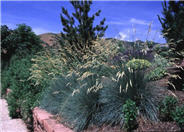
Common name:Blue Oat Grass
Botanical name:Helictotrichon sempervirens
The Blue Oat Grass is an evergreen, blue clumping grass that grows 12"-18" tall and wide. Its showy flowers are 1'-2' above the foliage. This plant looks good alone as well as in mass plantings. The blue oat grass likes dry hill sides and is drought tolerant.
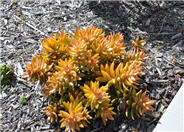
Common name:Orange Sedum
Botanical name:Sedum nussbaumeranian
This succulent perennial will grow best in a wall pot or hanging basket due to its long stems. It has light, gray green leaves that grow over one another to give off a "braided" look. The flowers are pink to deep red and bloom in spring and summer.
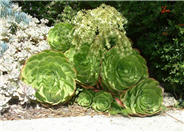
Common name:Parasol Aeonium
Botanical name:Aeonium arboreum
Parasol Aeonium is an upright succulent with rosette leaf clusters. It forms a mound and can be easily propagated by cuttings.
| Designer: Denise Pulley | Brick Wall along Side Walk |
Photographer: GardenSoft |
Soils and Compost:
Incorporate compost 6" into your soil to retain water, reduce compaction, feed earthworms, and provide valuable nutrients to your plants.
Water Saving Tip:
Check your irrigation system for breaks, leaks and problems once a month.
Integrated Pest Management:
Attract, or buy beneficial insects such as ladybugs and lacewings to control pest outbreaks in your garden.
